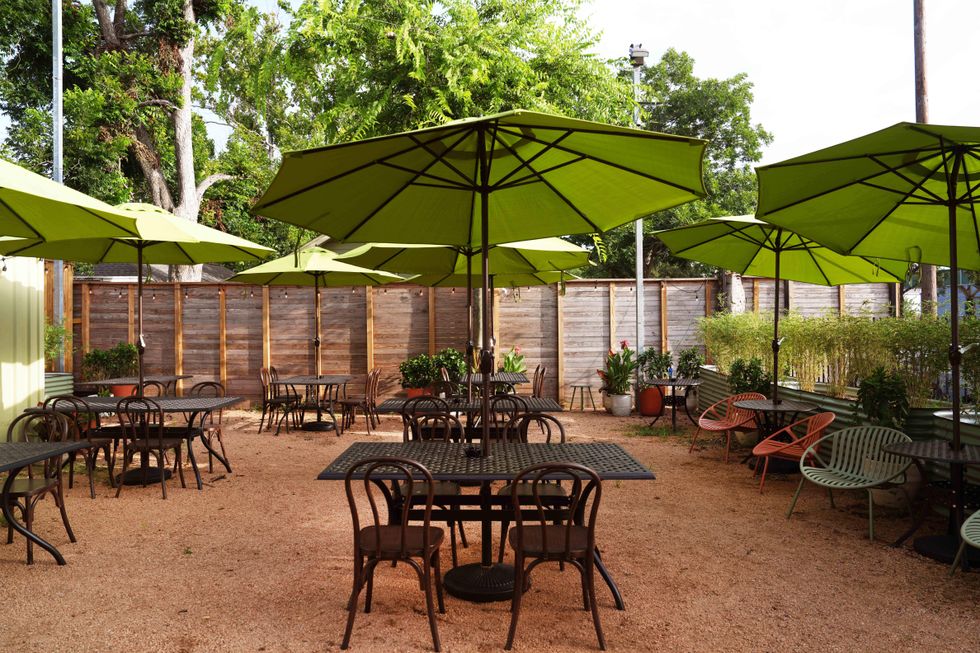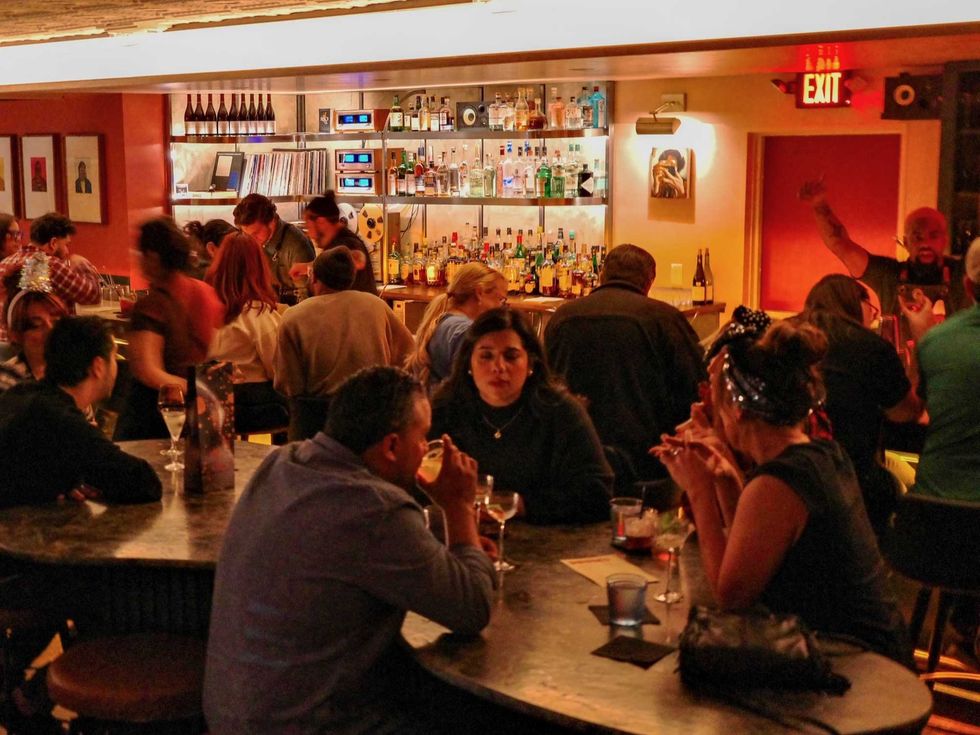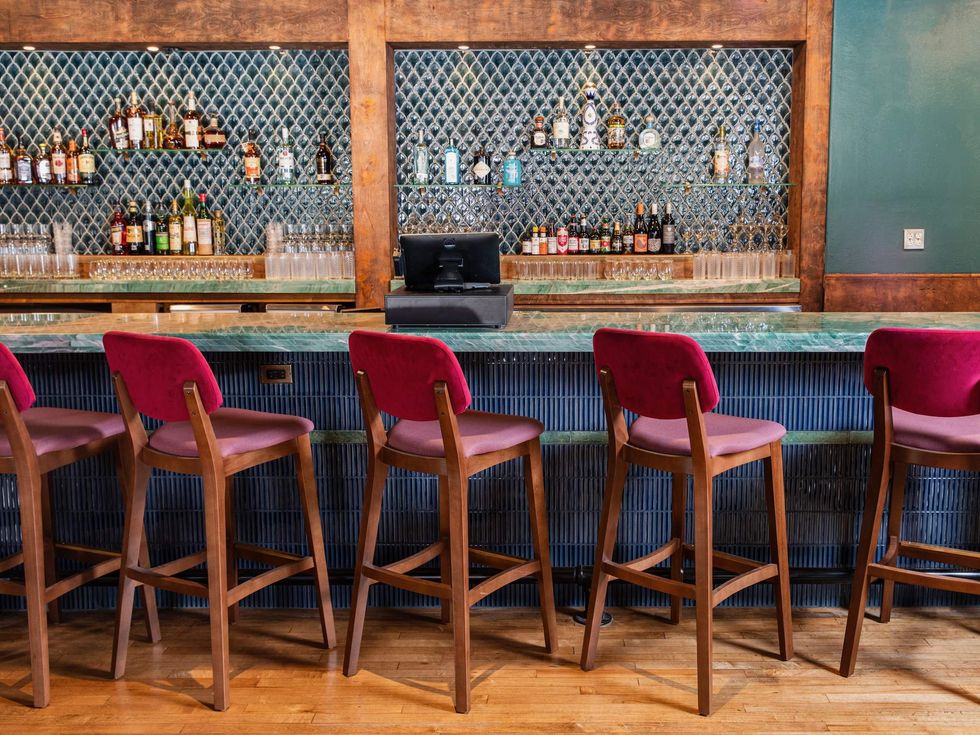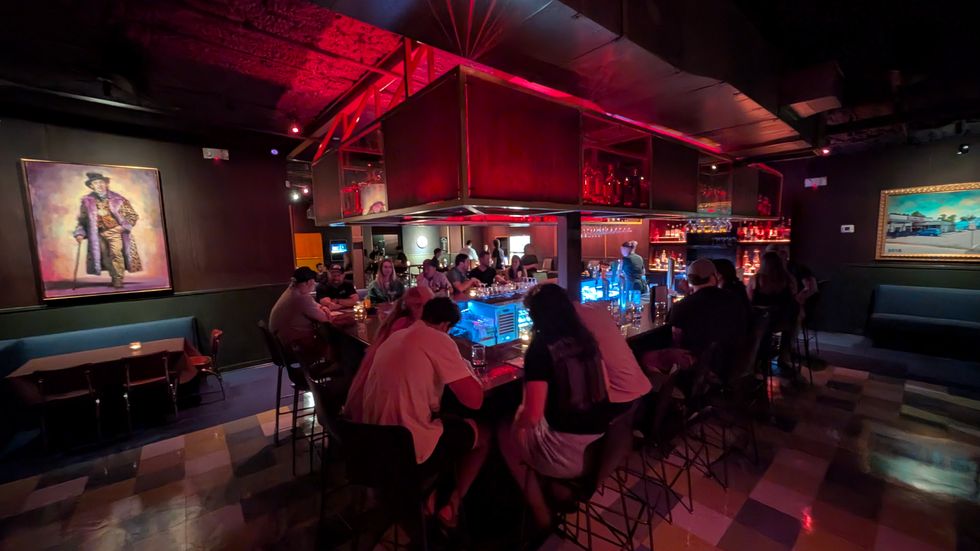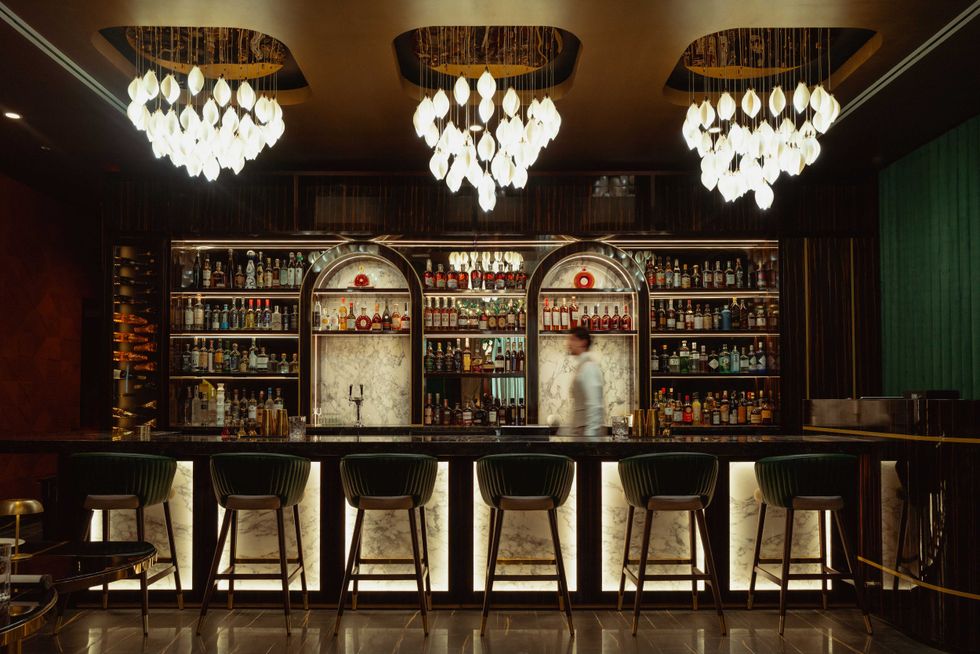This was a standout year for new bars in Houston, with elevated cocktail lounges opening alongside neighborhood hangouts. Whether you’re after a cold beer while watching the Texans on a Heights patio or a tiny martini inside an emerald-green, celestial-inspired hideaway near the Galleria, these 11 openings defined Houston’s bar scene in 2025.
Augustine Lounge
Hotel Saint Augustine has been racking up awards since it opened — receiving a Michelin Key and best new hotel honors from both Esquire and Travel + Leisure. Its bar, Augustine Lounge, matches that acclaim with a focused drinks program featuring highlights like the Coyote Call, a mix of mezcal, port, and Blackstrap rum accented with raspberry, lime, and nutmeg. The food menu leans elevated but unfussy, with offerings such as a charcuterie board with duck prosciutto and a wagyu hot dog tucked into a brioche bun. It also hosts vinyl nights featuring DJ sets from high profile Houstonians. Augustine Lounge is located at 4110 Loretto Drive and open daily from 11 am-12 am.
Bar Doko
Created by Duckstache Hospitality experts (Kokoro, Handies Douzo, Himari, and Aiko) as a companion to its sushi restaurant Doko, Bar Doko has an intimate, 16-seat atmosphere and an extensive selection of Japanese whisky. Small bites shine here, including a masu crudo topped with smoked trout roe and a Jidori egg salad toast. Beverage options range from highballs, martinis, sake, beer, and wine to inventive cocktails like the “Sora” Sky, made with sesame-infused tequila, Maven cold brew, toasted barley, coffee liqueur, and vanilla miso foam. Bar Doko is located at 3737 Cogdell Street, Suite 135, and is open daily from 4 pm-2 am.
Bar Madonna
One doesn’t need a room at the Marlene Inn — a grand neoclassical home turned nine-room hotel — to enjoy this elegant watering hole. Bar Madonna takes its name from a striking, 10-foot painting of the Virgin Mary, relocated from an 18th-century Italian church. Leading the beverage program is Tom Hardy, formerly of Hotel Saint Augustine, whose menu balances Old World influence with New Orleans flair.
This is a seated-only bar, offering 12 interior seats plus additional patio seating, and while reservations aren’t required, they’re often helpful. Signature libations include the Wild Ouest, a tequila-forward blend with poblano, lime, and mezcal inspired by “cowboy boots down the Champs-Élysées.” Bar Madonna is open Monday-Thursday from 3-10 pm, Friday from 3-11 pm, Saturday from 12-11 pm, and Sunday from 12-10 pm.
Berwick’s Bird of Paradise
A tropical escape awaits at Berwick’s Bird of Paradise, created by veteran bartender Robin Berwick of Midtown's beloved Double Trouble. The space was fully renovated to invoke a resort bar attached to an imaginary hotel, complete with playful design touches and a mythical “owner” depicted on the wall. Tropical drinks anchor the menu — think spicy, frozen tequila riffs and a coconut-infused Crocodile Tears Martini — alongside a selection of bar bites like smash burgers, chicken wings, and a Bikini sandwich. Known colloquially as "Be Bop," the bar has quickly attracted locals, industry regulars, and neighbors. Open Tuesday-Thursday from 4 pm-12 am, Friday-Saturday from 3 pm-1 am, and Sunday from 2 pm-10 pm, Berwick’s Bird of Paradise is at 2020 Studewood Street.
Donna’s
The newest cocktail destination on this list, Donna’s quickly built a following after opening Thanksgiving weekend in the former Ready Room space. Named after the grandmother of co-founder Jacki Schromm, the bar is a collaboration between the veteran bartender and Anvil owner Bobby Heugel. Together, the duo aims to create a house-party atmosphere, with energetic weekends balanced by more laid-back weeknights. A vintage stereo system — complete with a reel-to-reel and a turntable — sets the soundtrack, loud enough to entertain but low enough for conversations. The Jacki’s Martini, a 50-50 mix of gin with Cocchi Americano and Dolin Blanc vermouth, nods to both the “Bobby’s Martini” at Refuge and Squable’s “Terry’s Martini.” Donna's is open daily from 2 pm-2 am at 2626 White Oak Drive.
Endless Bummer
Walk the line between Houston and hell at Endless Bummer, the tiki bar next to Beteleguese Beteleguese’s Montrose location. Skeletons, imps, and tiki idols fill the 50-seat space, turning Endless Bummer into an immersive experience displaying works by local artists. The cocktail menu reimagines tropical standards like daiquiris, mai tais, and punches, while originals include the Banana Hammock — a banana-coffee vodka drink — and the Bitter Bird, made with Jamaican rum, Campari, pineapple, yuzu, and strawberry. Located at 4500 Montrose Boulevard, Endless Bummer is open Wednesday-Sunday, from 5 pm-12 am.
Good God, Nadine’s
Designed to feel like the home of “everyone’s favorite eccentric aunt,” Good God, Nadine’s delivers a warm, casual atmosphere paired with playful, comfort-forward drinks. The Washington Corridor bar offers 17 beers and wines on tap, along with cocktails like the Mango Sticky Rice, made with vodka, coconut milk, mango, and pandan. Food options range from po' boys to cast-iron cornbread and oysters on the half shell. Patrons can choose between three distinct areas: an indoor bar, an air-conditioned patio, and a garden patio. Good God, Nadine’s sits at 33 Waugh Drive, and is open Tuesday-Saturday from 4 pm-12 am, and Sunday from 12 pm-8 pm.
The Kid
With a comfortable bartop, moody-but-visible lighting, and ample seating — The Kid nails the feel of a classic neighborhood hang. Inside, charming baby goat figurines — aka “kids” — peek out from behind chicken wire room dividers, while an astroturfed patio outside offers a prime spot to catch a game. From the team behind Flying Fish, Flying Saucer, and Rodeo Goat, the bar continues the group’s tradition of approachable comfort food, including burgers and loaded tater tots. Drink options include the La Fresita, a refreshing creation of tequila, strawberry, peach, lemon, and prosecco. Happy hour is weekdays from 4 pm-7 pm, with $8 cocktails and wines, plus an all-day happy hour on Tuesdays. Located at 1815 N. Durham Drive, The Kid is open Monday-Thursday, 4 pm-12 am, and Friday and Saturday, 4 pm-2 am.
Moon
Perched above Tavola, Moon is an elegant cocktail lounge inspired by the cosmos. A joint concept from the Bastion Collection — the hospitality group behind Michelin-starred Le Jardinier at the Museum of Fine Arts, Houston — and Cafe Natalie, Moon’s food options range from a black truffle croque monsieur to the Dark Side of the Moon, a chocolate moelleux with hazelnut crunch. House cocktails like the Nightfall, featuring spiced WhistlePig rye, dark rum, Oloroso sherry, and cherry, sit alongside classics such as French 75s, wines, mocktails, tiny martinis, and shots. For those craving something off-menu, head bartender Joao Diniz is known for crafting bespoke drinks on request. Moon is located at 1800 Post Oak Boulevard, Suite 6110, and is open Tuesday-Thursday from 5 pm-12 am, and Friday and Saturday from 5 pm-2 am.
Starduster Lounge
There’s something both nostalgic and timeless about Starduster Lounge, a Heights neighborhood bar that puts a subtle cosmic spin on West Texas style. Will Thomas, co-founder of White Oak Music Hall and owner of Dan Electro’s, teamed up with Benjy Mason of Johnny’s Gold Brick and Winnie’s to transform the nearly 100-year-old building into a charming destination with a rustic yet refined interior of leather, vintage tile, and wood, and a spacious, tree-shaded backyard. The menu is constantly evolving, but standout drinks include the Pecan or Pecan?, with rye, bourbon, and Licor 43. Steak night is on Thursdays, with other food offerings announced via the bar’s Instagram. Happy hour is Monday-Friday, 4 pm-6 pm, with half-off cocktails. Starduster Lounge is located at 3921 N. Main and is open Monday-Friday from 4 pm-2 am, and Saturday and Sunday from 2 pm-2 am.
CultureMap editor Eric Sandler's Honorable Mention: Montrose Grocer
Building on her experience as the owner of Avondale Food & Wine and Heights Grocer, Houston entrepreneur Mary Clarkson opened this wine shop next to Catbirds. What distinguishes it from Heights Grocer is that MG also has a carefully-chosen selection of wines by-the-glass and bottle available for drinking on-site. Paired with snacks in the form of sandwiches and charcuterie boards and enhanced by a soundtrack of 4,000 records, Montrose Grocer has become a popular spot with hospitality workers and wine lovers who appreciate its low key atmosphere and affordable prices. (Full disclosure: Clarkson and Sandler are friends. She is a regular contributor to CultureMap's "What's Eric Eating" podcast.)
 The Haven kitchen, led by Randy Evans, would qualify as a lardcore center.Photo by Kimberly Park
The Haven kitchen, led by Randy Evans, would qualify as a lardcore center.Photo by Kimberly Park Houston's Bryan Caswell was name checked in the Time magazine article on the newrespect for Southern cuisine.
Houston's Bryan Caswell was name checked in the Time magazine article on the newrespect for Southern cuisine. Chris Shepherd would be another great example of the movement.Photo by Janice Schindeler
Chris Shepherd would be another great example of the movement.Photo by Janice Schindeler What's your favorite Houston lardcore spot?
What's your favorite Houston lardcore spot?



